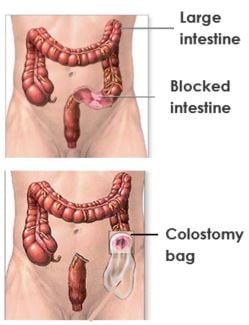What is a colostomy or ileostomy?
A colostomy or Ileostomy is needed when the intestine is not working and keeps stool from passing. It is a connection from the intestine to outside the body. It lets stool pass from the body. It is often called an ostomy.
Why is a special diet needed?
People with an ostomy are at risk for:
- Blockage of the ostomy
- Gas and foul odor
- Diarrhea
- Dehydration
Changing what and how your child eats can help limit or stop these problems.
General tips for eating
- Eat meals regularly – this helps reduce gas.
- Chew food well – it helps to prevent blockage.
- Try new foods one at a time – This way you will know which foods are giving your child problems. If a food seems to cause problems, your child should not eat that food for a few weeks. Try it again later to see if it really was the cause of the problems.
How can blockage be prevented?
Be careful when eating the following foods. Our bodies do not fully digest these foods. This can lead to blockage. Your child should not eat large amounts of these foods and should chew them well.
- Nuts and seeds
- Popcorn
- Raisins
- Coleslaw
- Celery
- Dried fruits and pineapple
- Peas
- Chinese vegetables
- Wild rice
- Coconut
- Corn
- Fruit peels and citrus pith
Do not avoid all of these foods. Let your child try the foods if they like them or want to eat them. Only by trying them one at at time you learn which foods your child should not eat.
How can foul odor be prevented?
- Add yogurt, kefir, buttermilk, cranberry juice and parsley to your child’s diet.
- To reduce the odor of the stool in the ostomy bag, deodorizing products can be ordered from the home care company. Please talk to your child’s nurse if foul odor is a concern.
Use caution when giving your child these foods, which can sometimes cause foul odor:
- Asparagus
- Fish
- Eggs
- Onions and Garlic
- Cabbage
- Cauliflower and broccoli
- Legumes and baked beans
- Strong cheeses
How can gas be prevented?
Having some gas is normal. Eating regularly helps reduce gas. Avoid activities that may cause your child to swallow air such as drinking through a straw, chewing gum or eating too fast. This should help in managing gas. The following foods can sometimes cause more gas:- Asparagus
- Broccoli
- Cauliflower
- Cucumber and melon
- Fish
- Soda
- Sweets and chewing gum
- Beans
- Peas
- Nuts
- Milk and eggs
- Onion, pickle, radish, and cabbage
How can loose stools be prevented?
These foods may cause loose stools:
- Broccoli
- Raw fruits and vegetables
- Green leafy vegetables
- Fried foods
- Milk
- Fruit juice and soda
- Beans
- Chocolate
Eating these foods can help control loose stool or thicken ostomy output:
- Bananas
- Tapioca
- Peanut butter (Creamy)
- Apple sauce
- Oatmeal and farina
- Peeled potatoes
- Cheese and yogurt
- White rice and pasta
- Marshmallows
If ostomy output is very severe, your child can be at risk of losing too much body fluid (dehydration). The signs and symptoms of dehydration include:
- Dry mouth and lips
- Less urine than normal
- Less tears than normal
- Possible decrease in activity, tired
- Dark urine
Drinking plenty of fluids can help prevent dehydration.
| Weight in pounds | Fluids per day |
|---|---|
| 10 pounds | 30 ounces (3 3/4 cups) |
| 20 pounds | 16 ounces (2 cups) |
| 30 pounds | 40 ounces (5 cups) |
| 40 pounds | 48 ounces (6 cups) |
| 50 pounds | 52 ounces (6 1/2 cups) |
| 60 pounds | 55 ounces (7 cups) |
| 80 pounds | 61 ounces (7 1/2 cups) |
| 100 pounds | 67 ounces (8 1/4 cups) |
| 120 pounds | 73 ounces (9 cups) |
| 140 pounds | 79 ounces (10 cups) |
| 150 pounds | 82 ounces (10 1/4 cups) |
| 160 pounds | 85 ounces (10 1/2 cups) |
What if my child is sick?
If your child is sick, use the chart above to make sure that they are getting enough fluids. It is also helpful to mix Gatorade® or Pedialyte® into their water. This mixture helps to give extra electrolytes that may be lost when sick. To do this, take your child's fluid goal and and replace half of the water with Gatorade or Pedialyte.
Example: If your child needs 10 cups of fluid, mix together 5 cups of water and 5 cups of Gatorade or Pedialyte.
What about formula feeding?
Having an ostomy should not interfere with formula feeding. By the time your baby leaves the hospital, they should be taking full-strength formula. Follow your doctor’s plan for feeding your child.



